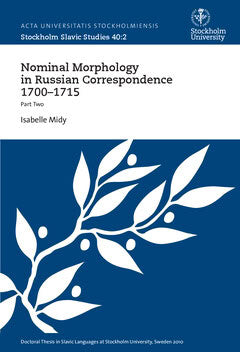
Artikeln har lagts till i varukorgen
Stockholm University
Ny bok | Häftad
Läs mer om olika typer av bindningar här.
LEVERANS: Skickas inom 6-14 vardagar.
LEVERANS: Vi skickar din beställning med Postnords Varubrev eller DHL Servicepoint.
Du betalar alltid endast 49 kr i fraktavgift inom Sverige, oavsett vikt eller antal böcker vid beställning av antikvariska och nya böcker från oss! Läs mer
Det gick inte att ladda hämtningstillgänglighet
En julklapp? Beställ dina julklappsböcker i tid! Var vänlig och lägg märke till leveranstiden nedan. Och oavsett angiven leveranstid, på grund av osäkerhet i leveranser inför jul, rekommenderar vi att du lägger din beställning senast 10 december.
ENDAST 49 kr i fraktavgift inom Sverige, oavsett antal böcker!
Du betalar alltid endast 49 kr i fraktavgift inom Sverige, oavsett vikt eller antal böcker vid beställning av antikvariska och nya böcker från oss! Läs mer
ÅNGERRÄTT inom 14 dagar efter leverans.
RETUR & ÅNGERRÄTT: Du har alltid 14 dagars ångerrätt oavsett anledning, från den dagen du tar emot din leverans.
Skulle vår beskrivning av skicket på boken misstämma eller om vi på annat sätt gjort fel, står vi självfallet för returfrakten.
I KORTHET: Analysis of 18th-century Russian letters reveals linguistic evolution, morphological heterogeneity, and variation in standardized and non-standardized texts.
Nominal morphology in Russian correspondence 1700-1715: Part Two erbjuder en unik insikt i rysk språkutveckling. Du får en grundlig analys av 121 brev som visar på morfologisk variation och språkets evolution under tidigt 1700-tal. Boken riktar sig till språkvetare och historiker, och ger en detaljerad förståelse för grammatiska förändringar och bevarande i olika texttyper. Genom att läsa den här boken kommer du att fördjupa din kunskap om rysk grammatik och dess historiska kontext.
The materials examined here consist of 121 Russian letters dating from 1700-1715. The present study aims to define a stage in linguistic evolution and analyze the morphological heterogeneity in the textual corpus. The letters are divided into three categories: private, semiofficial, and official. All nomina (substantives, adjectives, pronouns, and numerals) are registered and their occurrences processed statistically case by grammatical case. The focus is on linguistic features where a choice is possible and variation is in evidence. Conservatism asserts itself primarily in strongly standardized texts such as the official correspondence, while phonetic spelling reflecting akanie and dialectally influenced syncretism between different cases (e.g., the GDLsg) is observable mainly in the private letters, which consitute the least standardized category. There is a trend break among u-genitives and u-locatives, where our findings indicate that the u-ending is losing ground. A statistically established correlation between declensional type and the presence/absence of a coordinated adjunct is noted in the instrumental plural of masculine o-, jo-stems. The choice of the archaizing Ipl-ending suggests that repetition of the -mi- element is perceived to be redundant. In the singular paradigm of the adjective the feminine instrumental forms are strongly conservative, and the modern short ending occurs in only a few instances. In the nominative plural the modern ending -ye, -ie dominates for all cases and in all letter categories. The use of samyj for the comparative degree is not particularly prominent in these 18th-century letters. Because this descriptive comparison type developed in the 17th century, its use could have been expected to rise in the 18th, but our materials do not indicate any such increase. With few exceptions, pronouns generally display forms corresponding to modern usage. One notable deviation is the occurrence of a pronoun with an adjectival ending in the genitive singular (tago), but it is an idiosyncratic feature. Numerals for the most part correspond to modern usage, although their low frequency does not invite generalizations.
Bindning: Häftad. 8:o (165x242 mm)År: Utg. 2015. Omfång: 226 s. ISBN: 9789186071622. Språk: Engelska
Författare: Midy, Isabel
Titel: Nominal morphology in Russian correspondence 1700-1715
Undertitel: Part Two
Förlag: Stockholm University
Genre: Språk (inkl. lexikon, parlörer och ordböcker)
Artikelnr: 38658212
Nominal morphology in Russian correspondence 1700-1715 av Isabel Midy hittar du under genren Språkvetenskap inom Språkvetenskap & lingvistik i kategorin Humaniora. Hitta fler liknande böcker:
Hitta fler liknande böcker med dessa ämnesord:
